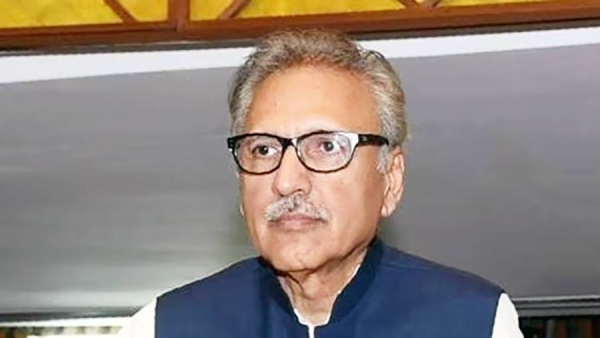
Pakistan President Dr. Arif Alvi on Wednesday proposed the date for general elections in the country as Nov. 6 in a letter written to Chief Election Commissioner (CEC) Sikandar Sultan Raja.
In his letter to the CEC, the president mentioned that he had dissolved the National Assembly on the prime minister"s advice on Aug. 9.
Citing Article 48(5) of the Constitution of Pakistan, he said the article, "empowers and mandates the president to appoint a date not later than 90 days from the date of the dissolution, for the holding of a general election to the Assembly."
The president said that in terms of Article 48(5), the general election to the National Assembly should be held by the 89th day of the date of dissolution of the National Assembly, i.e. Monday, Nov. 6, 2023.
The president recalled in the letter that "in an endeavor to fulfill the constitutional obligations, the chief election commissioner was invited for a meeting to devise the modalities of implementing the constitutional intent and mandate."
The president"s advice to the CEC comes against the backdrop of divided opinions among stakeholders, including political parties, on the time frame for general elections.
The ECP said that the elections will be pushed beyond the constitutionally mandated cutoff date following the notification of new 2023 digital census results.
The president’s missive is a mere suggestion, rather than a declaration of the election date, analysts said.
Moreover, the Law Ministry also had the same view as the ECP on the matter, and it said that all four provincial governments were of the opinion that the announcement of the election date was the Election Commission of Pakistan’s (ECP) mandate.
“Further, there is a consensus that to strengthen the federation and to promote unity and harmony amongst provinces and to avoid incurring unnecessary expenses, general elections to the National Assembly and the provincial assemblies must be held on the same day,” it further stated.
The ECP has yet to issue a response to the letter. The president’s advice to the CEC comes against the backdrop of divided opinions among stakeholders on the timeframe for elections.
Interim Prime Minister Anwaarul Haq Kakar has taken the same position on the matter but has also clarified that the caretaker government would act in accordance with the court ruling if the Supreme Court issued a binding judgement for elections to be held within the prescribed period of 90 days.
Earlier Wednesday, caretaker Law Minister Ahmad Irfan Aslam held a meeting with the provincial law ministers, during which participants underscored the importance of upholding the principles of democracy and ensuring the smooth conduct of elections.
It was unanimously agreed that the Constitution must be “read as a whole” and no provision of the Constitution be read in isolation from other relevant provisions. As per the Constitution, the conduct of general elections and announcement of election dates is the sole competence of the ECP, said a statement carried by state-run APP.
The statement added that provincial law ministers called for holding elections of all legislatures on the same day and asserted that it was the responsibility of all state organs to respect the autonomy of the ECP and its authority in carrying out the delimitation of constituencies and determining the election schedule.
Separately, British High Commissioner Jane Marriott said she had an important meeting with CEC Raja Wednesday. “We agreed that it’s crucial the country sees free, credible, transparent and inclusive elections in line with the law,” she posted on social media platform X.
The PTI welcomed today’s development and said the president had fulfilled his constitutional duty.
Former attorney general for Pakistan Ashtar Ausaf Ali explained while speaking to Geo News that in his letter, the president had suggested a date for elections, not appointed a date. He said the president did not have any mechanism or executive right to appoint the election date. Appointing the election date was the ECP’s job, he added. — Agencies












